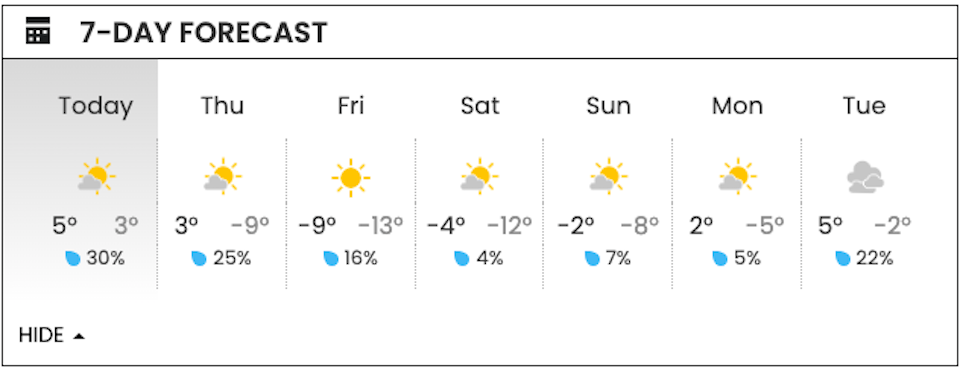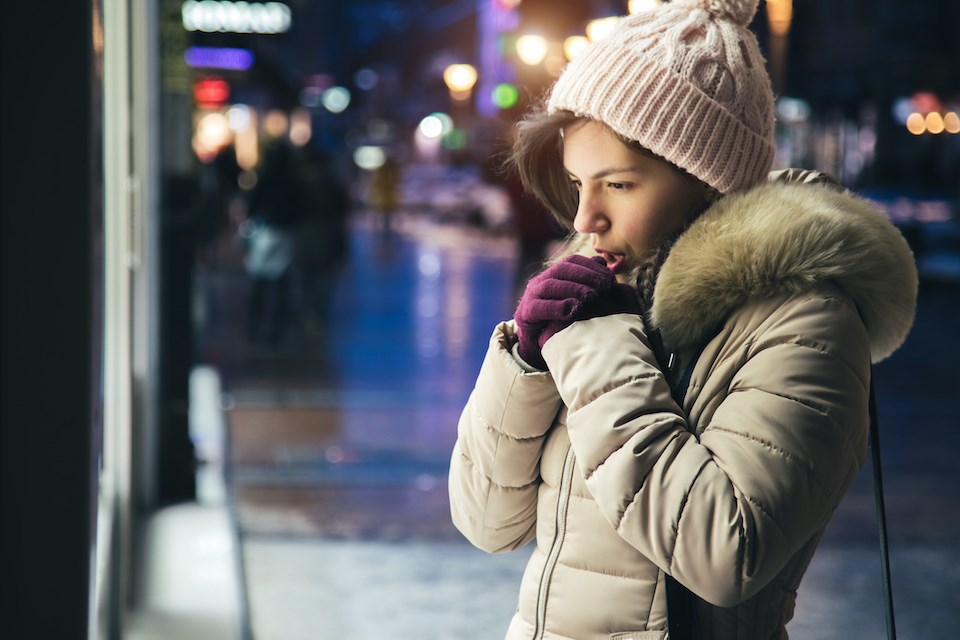A blast of cold artic air could bring temperatures that feel as cold as -20 C in Metro Â鶹´«Ã½Ó³»this week.
Ahead of the extreme cold, the Metro Â鶹´«Ã½Ó³»weather forecast includes the potential for snow at sea level, while places at higher elevations, including parts of major B.C. highways, are expected to receive significant snowfall.
V.I.A.'s Downtown Centre Weatherhood station in Â鶹´«Ã½Ó³»shows temperatures close to seasonal averages on Wednesday, Jan. 10, with the area expected to see a high of 5 C, falling to 3 C overnight.
The bone-chilling cold is expected to make its way into the region on Thursday, as temperatures aren't expected to climb above 3 C. While the morning may start with a mix of sun and cloud, the afternoon is expected to be cloudy and windy with a 40 per cent chance of flurries. However, the snow event isn't expected to be widespread at this time.
Temperatures are expected to fall drastically overnight, dipping to -9 C; there is also another possibility for flurries.
Environment Canada meteorologist Armel Castellan told V.I.A. that ice may form on roadways and sidewalks if snowfall accumulates; there would need to be 2 to 4 cm of accumulation for this to be a significant concern.
While Friday's forecast includes the week's coldest temperatures, conditions are expected to be dry. A high of -9 C is expected during the day with temperatures falling to -13 C overnight, according to Weatherhood.
Metro Â鶹´«Ã½Ó³»weather forecast could include arctic outflow warning
Castellan said the deep freeze could be accompanied by winds of 40 km/h gusting up to 60 km/h, which would make conditions feel even colder at the peak of the cold weather event.
"An arctic outflow warning could be issued, which is when we have a combination of cold temperatures and wind," he explained, adding that temperatures could feel as cold as -20 C with the windchill.
Castellan characterizes the cold event as the first true "arctic blast of the season," cautioning people to prepare for the "dangerous" weather.
"People haven't been forced to adapt to this cold. We haven't had a winter yet," he remarked, noting that Â鶹´«Ã½Ó³»just had its warmest December on record.
"This will be similar to the first heat of the season: heat and cold are by far the strongest killers."
Saturday's forecast includes a frigid low of -12 C but the daytime high is expected to be significantly warmer. The warming trend is expected to continue, with temperatures increasing by several degrees heading into the start of next week.
Â鶹´«Ã½Ó³»Coastal Health (VCH) advises locals to remove snow and ice from sidewalks and clear storm drains of leaves and snow to prevent flooding ahead of the wintry weather. To avoid falling on icy walkways, use a slower and wider gait, taking small steps with your toes pointed out slightly.
People at greater risk of winter weather-related health effects include:
- People who are unhoused or insecurely housed
- People living in inadequate housing, such as inadequate insulation, electricity or heat (including those living in a state of energy or fuel poverty)
- People spending long periods of time outdoors (for work, recreation, or transportation)
- Older adults
- Infants and young children
- People with pre-existing health conditions, including conditions or diseases of the heart or lungs or health conditions that impact blood circulation (e.g. diabetes, or certain medications that constrict blood vessels)
- People who use substances, including alcohol
Local governments and community organizations in the VCH region (like libraries and community centres) where people can safely stay warm and avoid exposure to the cold.
Find out everything you need to know about travel during the cold weather event in B.C. and beyond.




